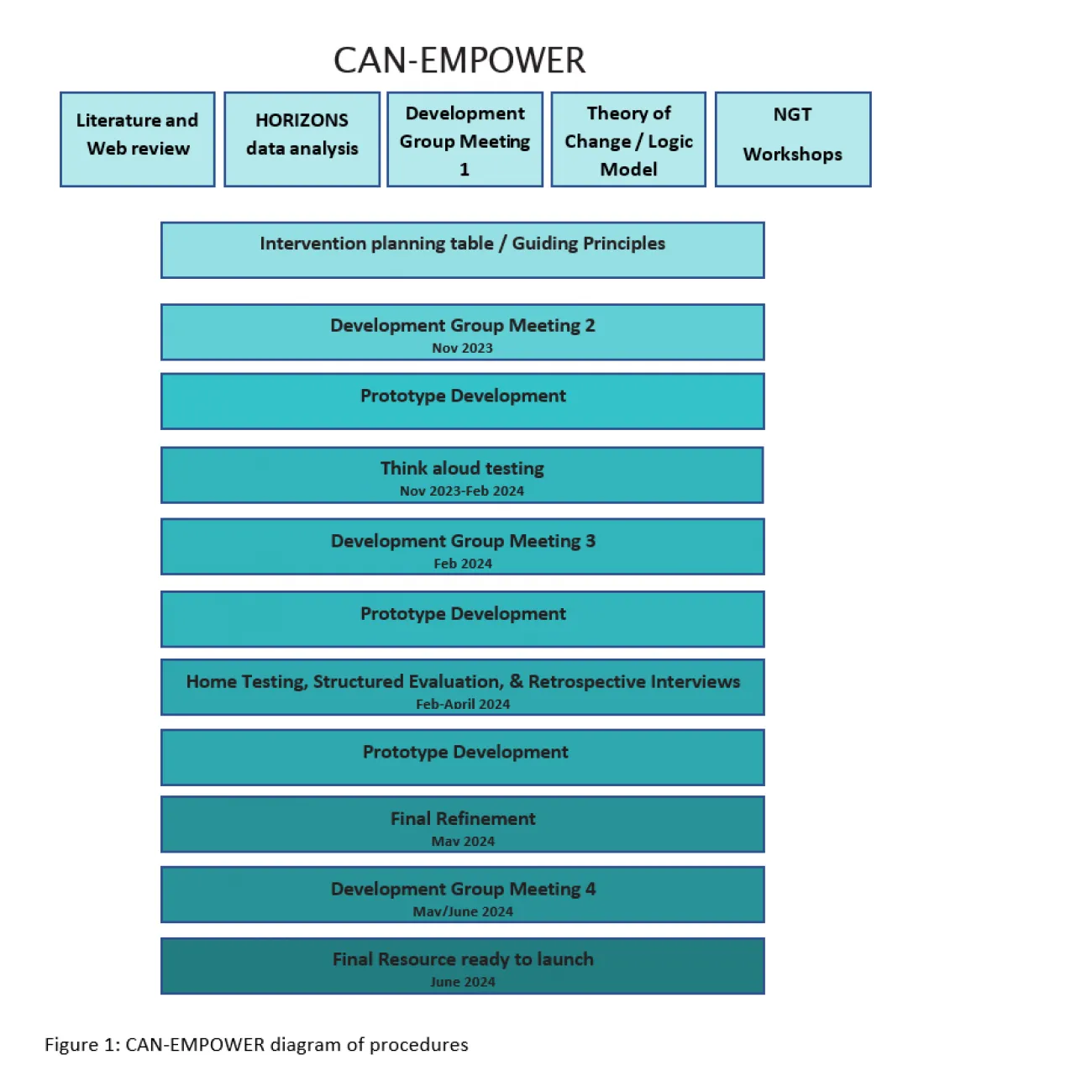Project overview
CAN-EMPOWER aims to develop a freely available, evidence-based digital resource to enhance confidence to manage psychological problems/well-being for people living with and beyond cancer.
The study design has been influenced by the Person Based Approach (Yardley et al 2015), an iterative set of methods and tools to develop interventions that people will find easy to use and engaging, by embedding input from people likely to use the resource throughout all of the research. The project consists of two work packages. Work package one brings together primary and secondary evidence to identify components and content of the online resource. Work package two refines the intervention through iterative user testing to ensure it is user friendly and appealing. Figure 1 shows the order of research activities planned and intended time frames for the project.
Work package one consists of five activities:
1) A literature and web review to learn what digital interventions have already been developed and what is already available.
2) Analysis of HORIZONS study data (Foster et al 2019) to understand how anxiety and depression change over time in the intended target users.
3) Formation of a Development Group to assist with decisions regarding the developing resource.
4) Development of a Theory of Change to demonstrate what the resource needs to do and how it should do that.
5) Stakeholder workshops to identify what priorities the resource should contain and considerations of how it should look and feel.
Work Package two consists of three activities each interspersed with subsequent prototype development:
1) Think aloud alpha/beta/gamma testing of the early prototypes to gather users thoughts when interacting with the resource.
2) Two-week home testing and retrospective interviews to explore perceived benefits as well as barriers and facilitators to engagement.
3) Final Refinement to gather opinion on any concluding adjustments, ready for launch and dissemination.
The final outcome of the project is a freely available, theory driven, and evidence based online resource designed to build confidence in managing psychological problems associated with living with and beyond cancer.
The study design has been influenced by the Person Based Approach (Yardley et al 2015), an iterative set of methods and tools to develop interventions that people will find easy to use and engaging, by embedding input from people likely to use the resource throughout all of the research. The project consists of two work packages. Work package one brings together primary and secondary evidence to identify components and content of the online resource. Work package two refines the intervention through iterative user testing to ensure it is user friendly and appealing. Figure 1 shows the order of research activities planned and intended time frames for the project.
Work package one consists of five activities:
1) A literature and web review to learn what digital interventions have already been developed and what is already available.
2) Analysis of HORIZONS study data (Foster et al 2019) to understand how anxiety and depression change over time in the intended target users.
3) Formation of a Development Group to assist with decisions regarding the developing resource.
4) Development of a Theory of Change to demonstrate what the resource needs to do and how it should do that.
5) Stakeholder workshops to identify what priorities the resource should contain and considerations of how it should look and feel.
Work Package two consists of three activities each interspersed with subsequent prototype development:
1) Think aloud alpha/beta/gamma testing of the early prototypes to gather users thoughts when interacting with the resource.
2) Two-week home testing and retrospective interviews to explore perceived benefits as well as barriers and facilitators to engagement.
3) Final Refinement to gather opinion on any concluding adjustments, ready for launch and dissemination.
The final outcome of the project is a freely available, theory driven, and evidence based online resource designed to build confidence in managing psychological problems associated with living with and beyond cancer.

Staff
Lead researchers
Other researchers
Collaborating research institutes, centres and groups
Research outputs
Claire Foster, Lynn Calman, Alison Richardson, Carl R. May, Anne Rogers & Peter W. Smith,
2019, BMJ Open, 9(7), 1-8
Type: article
Lucy Yardley, Leanne Morrison, Katherine Bradbury & Ingrid Muller,
2015, Journal of Medical Internet Research, 17(1), e30
DOI: 10.2196/jmir.4055
Type: article

